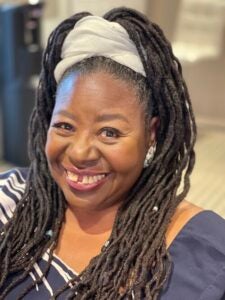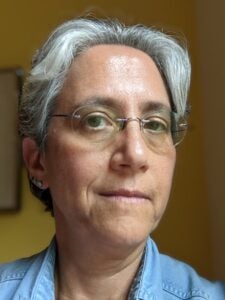Friday, September 24, 2021
2-3 pm EST
Watch a recording of the event here.
Under pandemic related restrictions, many people have gone a year or more without their annual cancer screening checks- but for communities in underserved and underrepresented areas, a year without preventative cancer screening measures is not uncommon. With doctors now preparing for more late stage cancer diagnosis due to lack of detection, how do we protect and advocate for communities of color that already face the highest cancer death rate and lowest survival rates.
Join the Zhu Family Center for a virtual discussion on how political, social, health and educational systems are intertwined in ways that drive the many disparities we see in cancer and other health domains.
Featuring
 Loretta J. Ross is an Associate Professor at Smith College. She is an activist, public intellectual, and a scholar. She started her career in activism and social change in the 1970s, working at the National Football League Players’ Association, the D.C. Rape Crisis Center, the National Organization for Women (NOW), the National Black Women’s Health Project, the Center for Democratic Renewal (National Anti-Klan Network), the National Center for Human Rights Education, and SisterSong Women of Color Reproductive Justice Collective, until retiring as an organizer in 2012 to teach about activism. Her most recent books are Reproductive Justice: An Introduction co-written with Rickie Solinger, and Radical Reproductive Justice: Foundations, Theory, Practice, Critique. Her forthcoming book is Calling In the Calling Out Culture due out in 2022.
Loretta J. Ross is an Associate Professor at Smith College. She is an activist, public intellectual, and a scholar. She started her career in activism and social change in the 1970s, working at the National Football League Players’ Association, the D.C. Rape Crisis Center, the National Organization for Women (NOW), the National Black Women’s Health Project, the Center for Democratic Renewal (National Anti-Klan Network), the National Center for Human Rights Education, and SisterSong Women of Color Reproductive Justice Collective, until retiring as an organizer in 2012 to teach about activism. Her most recent books are Reproductive Justice: An Introduction co-written with Rickie Solinger, and Radical Reproductive Justice: Foundations, Theory, Practice, Critique. Her forthcoming book is Calling In the Calling Out Culture due out in 2022.
She has been quoted in the New York Times, Time Magazine, The Los Angeles Times, and the Washington Post, among others. Her website is www.LorettaJRoss.com.
 Nancy Krieger is Professor of Social Epidemiology and American Cancer Society Clinical Research Professor at the Harvard T.H. Chan School of Public Health (HSPH) and Director of the HSPH Interdisciplinary Concentration on Women, Gender, and Health. She is an internationally recognized social epidemiologist (PhD, Epidemiology, UC Berkeley, 1989), with a background in biochemistry, philosophy of science, and history of public health, plus 35+ years of activism involving social justice, science, and health. She is an ISI highly cited scientist (since 2004; reaffirmed: 2015); the group comprises <0.05% of publishing researchers. Dr. Krieger’s work addresses: (1) conceptual frameworks to understand, analyze, and improve the people’s health, including her ecosocial theory of disease distribution. focused on embodiment and equity; (2) etiologic research on societal determinants of population health and health inequities, including structural racism and other types of adverse discrimination; and (3) methodologic research to improve monitoring of health inequities.
Nancy Krieger is Professor of Social Epidemiology and American Cancer Society Clinical Research Professor at the Harvard T.H. Chan School of Public Health (HSPH) and Director of the HSPH Interdisciplinary Concentration on Women, Gender, and Health. She is an internationally recognized social epidemiologist (PhD, Epidemiology, UC Berkeley, 1989), with a background in biochemistry, philosophy of science, and history of public health, plus 35+ years of activism involving social justice, science, and health. She is an ISI highly cited scientist (since 2004; reaffirmed: 2015); the group comprises <0.05% of publishing researchers. Dr. Krieger’s work addresses: (1) conceptual frameworks to understand, analyze, and improve the people’s health, including her ecosocial theory of disease distribution. focused on embodiment and equity; (2) etiologic research on societal determinants of population health and health inequities, including structural racism and other types of adverse discrimination; and (3) methodologic research to improve monitoring of health inequities.
 Natalia Linos is a social epidemiologist and the Executive Director of the FXB Center for Health and Human Rights at Harvard, where she has helped build a new research area for the Center focused on structural racism and health. Prior to her role at Harvard, Natalia worked at the United Nations leading UNDP’s work at the nexus of health and environment, and served as a speechwriter and policy specialist at the United Nations in New York and in Beirut, Lebanon. She also worked at the New York City Department of Health and Mental Hygiene and is currently a member of Brookline’s Advisory Council on Public Health. In 2020 and in response to the COVID-19 pandemic, Natalia ran for Congress to represent Massachusetts’ fourth Congressional district. Outside of work, she is an active Town Meeting Member in Brookline and serves on the Board of the Environmental League of Massachusetts.
Natalia Linos is a social epidemiologist and the Executive Director of the FXB Center for Health and Human Rights at Harvard, where she has helped build a new research area for the Center focused on structural racism and health. Prior to her role at Harvard, Natalia worked at the United Nations leading UNDP’s work at the nexus of health and environment, and served as a speechwriter and policy specialist at the United Nations in New York and in Beirut, Lebanon. She also worked at the New York City Department of Health and Mental Hygiene and is currently a member of Brookline’s Advisory Council on Public Health. In 2020 and in response to the COVID-19 pandemic, Natalia ran for Congress to represent Massachusetts’ fourth Congressional district. Outside of work, she is an active Town Meeting Member in Brookline and serves on the Board of the Environmental League of Massachusetts.
Natalia is a three-time Harvard University graduate, earning her Bachelor of Arts in Anthropology, Master of Science in Social Epidemiology, and Doctor of Science in Social Epidemiology here. She also holds a Certificate in Forced Migration from Oxford University’s Refugee Studies Centre. She speaks Greek fluently and has basic conversational skills in Arabic, Spanish and French. Natalia has three young children.
